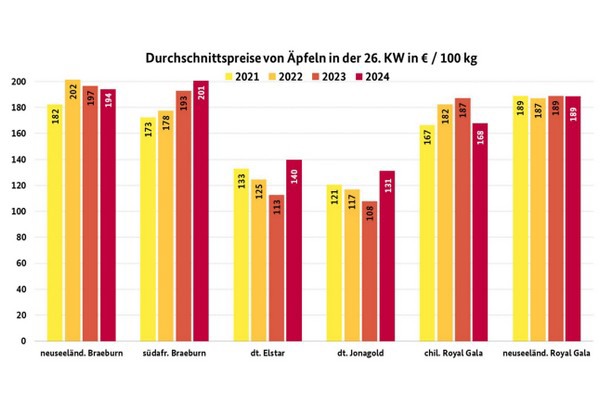The alternative European supply was dominated by domestic Elstar and Jonagold. Wellant, Braeburn and Tenroy followed in terms of importance, but with smaller volumes. Availability was limited due to seasonal factors. However, as the quality was still convincing, customers were happy to buy. Volume-induced price increases were observed from time to time. This was also the case with the Italian offerings: Pink Lady, Granny Smith and Golden Delicious were the main favourites. According to the BLE, the prices of French Jazz and Pink Lady also rose slightly on various occasions. The European assortment was rounded off by a few Dutch, Belgian and Polish shipments.
 © BLE
© BLE
Imports from overseas increasingly penetrated the market: New Zealand Braeburn and Royal Gala as well as Elstar and Royal Gala from Chile obviously dominated this sector. Braeburn and Kanzi were the main varieties from South Africa. Flavour, colouring and size generally left nothing to be desired. Nevertheless, business did not really take off; stone fruit and soft fruit were more in favour with buyers. Demand could therefore be met without difficulty. Prices did not change significantly. The new German campaign has already started in Berlin: the first capelin was offered at €2.40 per kg.
Pears
South African Trout, Abate Fetel and Packham's Triumph formed the basis of a relatively small offering. Demand was not particularly strong generally and was easily satisfied.
Grapes
Italian deliveries dominated and became noticeably more important: in addition to Victoria and Black Magic, Arra 30 and Michele Palieri were also available.
Strawberries
Domestic offerings predominated. Although their availability had increased overall, there was still not enough supply to meet demand in full. Dutch, Polish and Belgian deliveries were therefore needed to satisfy demand.
Apricots
Demand was favourable and could be met without difficulty. Here and there, traders were forced to make concessions, as surpluses would have built up otherwise.
Cherries
In terms of quantity, Spanish lots predominated over domestic and Turkish lots. The quality was broadly diversified: There were some differences in terms of colour, flavour, size and condition.
Peaches/nectarines
The summer weather had definitely increased interest. Nevertheless, the distributors were not able to increase their prices across the board, as availability had also improved.
Lemons
The assortment consisted of Spanish Verna and South African Eureka. Shipments from South Africa had increased somewhat, which led to falling prices in some areas.
Bananas
Marketing was relatively quiet. Availability was sufficient to cover demand. In some cases, there was slightly too much supply, which led to slight price drops.
Cauliflowers
Domestic produce dominated. Supplies were limited. However, as the summer weather also reduced storage options, this had no impact on the prcies.
Lettuce
Domestic offerings dominated the iceberg lettuce market, followed by Dutch offerings in terms of quantity. Business was steady overall, so that the ratings did not change significantly.
Cucumbers
The summer weather had stimulated demand, but deliveries were rather limited. Prices therefore rose, in some cases quite sharply. In some cases, prices only rose on Monday, but mostly prices rose gradually.
Tomatoes
As in previous weeks, Dutch and Belgian offers dominated the market. The assortment was broadly diversified and sufficient to cover demand. Demand was very favourable.
Sweet peppers
Dutch, Turkish and Belgian batches formed the basis of the supply, as is usual at this time of the season. In addition, a small number of Spanish, Polish and domestic consignments were also available.
Source: BLE










